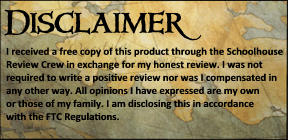I've always been impressed with the materials we've used from Classical Academic Press. Last year, Addison used their The Art of Argument materials to learn informal logic. Since we gave those products a favorable review, we were excited to receive The Discovery of Deduction materials this year so that Addison could study formal logic. The course materials include The Discovery of Deduction: An Introduction to Formal Logic for the student's use and a corresponding Teacher's Edition.
Addison jumped right into the course materials. She thought that formal logic would be interesting, but wasn't sure how applicable it would be. In one of her lessons, she found that formal logic is very useful in determining if you have contradictory beliefs without knowing it. She has especially enjoyed the square of opposition, but she says that the grammar nerd in her does not like translating sentences into categorical form.
She even drew a diagram to show some of what she has learned. She left it by the computer for me to see for a few days, but then moved it back up to her room so that she can reference it while she studies. (As a math nerd, I get her joke about the square of opposition, but she's lost me with all of the terms and relationships in the square.)
From a teacher's standpoint, I found this course to be among the most difficult that Addison has studied. The student text is set up so that she can work through the materials independently. After she had completed a few chapters, I sat down to check through her work. The teacher's manual has a complete copy of the student text with all of the answers filled in. Unfortunately, I found it difficult to make sure Addison's answers were correct in some cases. Many of the questions are short-answer style and asked her to give an example of a new concept. Her answers were similar to those in my book, but I'm not completely certain that I would be able to tell if they were completely correct.
In the case of Addison's logic studies, I'm content with her to just work through the materials independently. I hope that if she runs into any problems along the way that she'll be able to work them out by referring to the answers in my teacher's edition. If she can't, then I guess I'll start at the beginning of the book and learn formal logic alongside her.
Despite the fact that I don't fully understand what Addison is telling me about the logic she learns, I can tell that she's really thinking through the materials. I'm thrilled to have a logic program that challenges her.
The Discovery of Deduction student workbook costs $26.95 and the Teacher's Edition is $29.95. Classical Academic Press recommends it for students as young as eighth grade, and I think it is appropriate for any High School student.






This comment has been removed by a blog administrator.
ReplyDeleteUgh! I wasn't paying attention and accidentally removed Jen's comment. Here it is:
ReplyDeleteI like to think of myself as a logical person but I would love to learn logic in a more formal way than arguing with my dh and teenager. :-)
Seeing as I have never studied it formally but am an adult where would you recommend I start?
Thanks
Jen in Oz
(waving madly at an old friend who I don't catch up with often enough)
Hi Jen. I'm so sorry I messed up your comment -- I shouldn't be on the computer before I have coffee. ;)
ReplyDeleteHonestly, I'd recommend the Art of Argument because it's more useful in everyday life. It deals with the content of arguments (informal logic) and the ways that an argument can sound good but not actually be good at supporting the arguers case. I find practical applications when looking at TV advertisements, political speeches, or even my kids.
The Discovery of Deduction is formal logic, which is a lot more academic. The shortest way to explain it is to say that formal logic turns statements into mathematical-type statements so that you can draw conclusions. It's very good for thinking skills, but I'd prefer to know the practical side of identifying faulty informal logic first.
We do need to catch up more often! Cristi